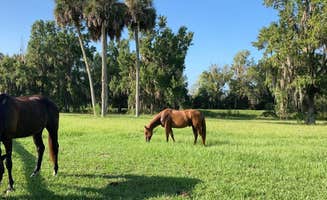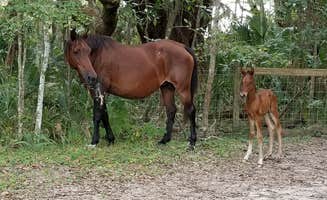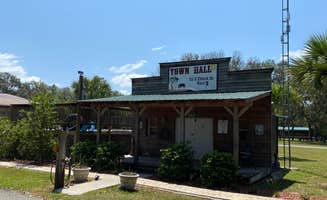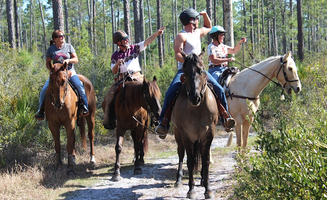Equestrian camping near Waldo, Florida offers diverse terrain options ranging from pine flatwoods to cypress swamps. The north-central Florida climate provides mild winter temperatures averaging 50-70°F, making it an ideal destination for year-round trail riding. Most equestrian facilities in the region require negative Coggins tests for all horses, and campgrounds often implement strict manure management protocols.
What to do
Wildlife viewing excursions: Paynes Prairie Preserve State Park Campground provides exceptional wildlife observation opportunities beyond horseback riding. "This park has 8 trails for hiking, biking and horseback riding. We were able to see wild horses, bisons, snakes and gators. Great for fishing and kayaking," notes Brenda S. The diverse ecosystem supports native Florida wildlife including bison herds.
Mountain biking trails: Santos Trailhead & Campground offers extensive mountain biking terrain for riders of all skill levels. "It's an international destination for mountain biking! While there are no mountains in Florida, there are many man made ramps and jumps and turns. It's remarkable to see," explains David G. The trail system includes technical features not commonly found in Florida's flat landscape.
Riverside hiking: Primitive camping at Bayard Conservation Area provides access to riverside trails and wildlife observation. "On our way to our campsite we were able to spot many animals including: deer, otter, turkey, and wild pigs," reports Jenn B. The conservation area maintains several miles of hiking paths through diverse habitats.
What campers like
Dark sky viewing: Campers appreciate the minimal light pollution at Paynes Prairie Preserve State Park. "Great location with plenty of dark skies. The spots are well spaced in the woods, with plenty of room," writes Joe R. The park's location away from major urban centers creates ideal conditions for stargazing and night photography.
Quiet, spacious sites: Cary State Forest Campground provides secluded camping with ample space between sites. "This campground was an absolute gem. Sites are spread out and HUGE!! Several trails and plenty of room for kids to play on site!!!" shares David S. The forest setting offers privacy not found at more developed campgrounds.
Educational programs: Some parks provide informative ranger-led activities. "We did the Ranger led hike which was really nice, my 5 year old struggled to keep up with the Ranger and there are decent elevation changes," notes Lindsey H. about Paynes Prairie. These programs help visitors understand the ecological and historical significance of the area.
What you should know
Seasonal insect considerations: Bug activity varies throughout the year at most north Florida campgrounds. "Hot with skeeters the majority of the year, cold overnight in the winter. All kinds of little critters in the woods and access to hikes and many gators," advises Dan X. about Paynes Prairie. Mosquitoes are most active during summer months, particularly after rainfall.
Pet restrictions on trails: O'Leno State Park and other area parks have varying policies regarding dogs on trails. One camper at Paynes Prairie noted, "The biggest disappointment for this state park is that all of the things they advertise (and I was looking forward to) - bison, horses, wildlife - are all on trails where pets are not allowed." Always check trail-specific regulations before planning activities with pets.
Primitive facilities: Many equestrian-focused sites have basic amenities. At Bayard Conservation Area, facilities are minimal. "There's a stop on the way near the other campsite that includes some picnic benches, a (non-potable) water pump, and a bathroom with a roof and toilet paper. What more could you want?" shares Nate D. Backcountry campsites typically lack electricity or running water.
Tips for camping with families
Wildlife education opportunities: Structured learning experiences make camping educational for children. "Lovely Park with lots of wildlife!! La Chua trail was beautiful and we saw lots of gators. We did the Ranger led hike which was really nice, my 5 year old struggled to keep up with the Ranger," notes Lindsey H. about Paynes Prairie Preserve.
Playground access: Welaka State Forest provides equestrian camping with additional recreational spaces. "This is a beautiful, quiet and secluded equine campground. It's the perfect spot for those who love the outdoors," shares AnnMarie E. The campground layout allows children to explore while remaining within sight of campsites.
Supply planning: Remote locations require advance preparation. Regarding Welaka State Forest, one camper advises, "Please note there isn't much close by, so stop at the grocery and get fuel before you turn off 17." Most equestrian campgrounds in the region are located 15-30 minutes from the nearest grocery stores or gas stations.
Tips from RVers
Electrical capacity: Check amperage before booking at equestrian sites. At Cary State Forest, one camper reported: "When we arrived and hooked up the 30amp breaker kept flipping. We had just left crooked river and hadn't had any issues." Some older facilities may have limited electrical capacity during peak usage.
Site orientation awareness: Note utilities placement when selecting sites. "The only thing preventing me from giving five stars is we got the only site that had electric and water on passenger side so we had to run electric under our rig," notes David S. about Cary State Forest. Many equestrian campgrounds have sites designed primarily for horse trailers rather than recreational vehicles.
Hard-packed surfaces: Etoniah Creek State Forest and similar areas have specific surface conditions. "Note the roads are hard-pack and it is a Florida pine forest so it gets a bit muddy (and mosquito-y) on rainy days. Dump station is not fully paved so it too, gets muddy," explains J V. regarding Cary State Forest. Most equestrian camping areas utilize compacted sand or limestone roadways.






